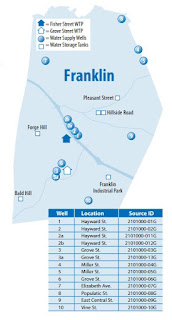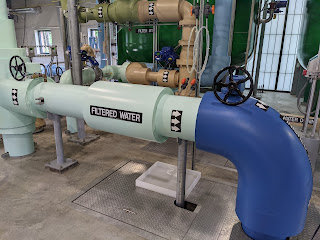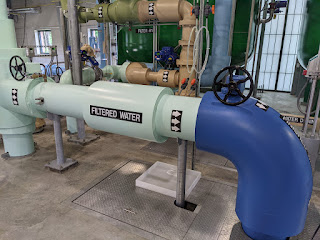Video link -> https://www.youtube.com/watch?v=iXjT1elh2lA |
Providing accurate and timely information about what matters in Franklin, MA since 2007. * Working in collaboration with Franklin TV and Radio (wfpr.fm) since October 2019 *
Sunday, August 31, 2025
How to avoid scams when looking for drug treatment (video)
Wednesday, November 13, 2024
Request for Qualifications - General Contractor and Subcontractor Prequalification for Fisher Street Water Treatment Plant Upgrade
 |
| Request for Qualifications - General Contractor and Subcontractor Prequalification for Fisher Street Water Treatment Plant Upgrade |
Tuesday, October 1, 2024
New well 7/7A treatment Facility Addition Construction to get underway soon
 |
| New well 7/7A treatment Facility Addition |
"Construction of the Well 7/7A PFAS Treatment Facility Addition will be getting underway soon. The project is being financed with a 0% loan from the Drinking Water State Revolving Fund (DWSRF) and is expected to be completed by January 2026.The project includes the construction of an on-site treatment facility that will house granular activated carbon (GAC) pressure vessels and associated ancillary equipment as an addition onto the Well 7/7A pump station.
In December 2020, the detected PFAS concentrations exceeding the MCL occurred, therefore use of the well was discontinued at that time. This project will benefit the Town by reducing the PFAS at Well No. 7/7A to below the regulated limits for continued use of this important water source in the Franklin system.The DWSRF program is administered by MassDEP with joint funding from the U.S. Environmental Protection Agency and the Commonwealth of Massachusetts. DWSRF programs operate around the country to provide States and communities with the resources necessary to maintain and improve the infrastructure that protect our valuable water resources nationwide."
Friday, September 13, 2024
Town of Franklin: Request for Qualifications - OPM for Fisher Street Water Treatment Plant Upgrades
Request for Qualifications - OPM for Fisher Street Water Treatment Plant Upgrades
In accordance with Chapter 149, Section 44A1/2 of the Massachusetts General Laws, it is the intention of the Town of Franklin to retain the services of an Owner's Project Manager (OPM) for the Fisher Street Water Treatment Plant Upgrades project.
Additional Information: RFQ for OPM for the Fisher Street Water Treatment Plant Upgrades
shared from -> https://www.franklinma.gov/purchasing/bids/request-qualifications-opm-fisher-street-water-treatment-plant-upgrades
 |
| Franklin DPW building , 257 Fisher St |
Tuesday, July 16, 2024
DelCarte - Upcoming treatment visit July 19, 2024
Restrictions are as follows:
Swimming - until 07/20/2024
Livestock Watering - until 07/20/2024
Drinking - until 07/20/2024
Irrigation - until 07/24/2024
If you have any questions, please don't hesitate to contact the Project Manager, Tanner Poole at tanner.poole@solitudelake.com or 508-834-2838, who will be responsible for compliance with the permit conditions.
Shared from -> https://www.franklinma.gov/conservation/news/delcarte-upcoming-treatment-visit-july-19th-2024
 |
| DelCarte - Upcoming treatment visit July 19, 2024 |
Wednesday, May 22, 2024
MMA: "EPA designates two PFAS chemicals as hazardous"
"The U.S. Environmental Protection Agency has designated two so-called forever chemicals — perfluorooctanoic acid (PFOA) and perfluorooctanesulfonic acid (PFOS) — as hazardous substances under the Comprehensive Environmental Response, Compensation, and Liability Act, known as CERCLA, or Superfund.The EPA’s rulemaking, issued on April 19 and effective on July 8, represents another step in the EPA’s plans to prevent pollution and address contamination from per- and polyfluoroalkyl substances, or PFAS.PFAS have been commonly used in manufacturing because of their stain-resistant, water-resistant, and non-stick qualities. This family of very stable chemicals remains in the environment for a long time and is resistant to traditional contaminant remediation measures. PFAS are also considered hazardous to human health."
Friday, March 29, 2024
Invitation for Bids (IFB) - Well 7/7A PFAS Treatment Facility
IFB - Well 7/7A PFAS Treatment Facility
The Town of Franklin, Massachusetts requests bids for construction of the Well 7/7A PFAS Treatment Facility project.
Sealed Bids for the General Contract for construction of the Well 7/7A PFAS Treatment Facility will be received by the Chief Procurement Officer, Municipal Building, Room 206, 355 East Central Street, Franklin, Massachusetts until 10:00AM, Wednesday May, 8, 2024 and at that time and place bids will be publicly opened and read aloud.
Sealed Bids for the filed SubContracts designated herein will be received at the office of the Chief
Procurement Officer, Municipal Building, Room 206, 355 East Central Street, Franklin, Massachusetts until 10:00 AM, Wednesday April 10, 2024 and at that time and place bids will be publicly opened and read aloud.
Shared from -> https://www.franklinma.gov/purchasing/bids/ifb-well-77a-pfas-treatment-facility
 |
| Invitation for Bids (IFB) - Well 7/7A PFAS Treatment Facility |
Monday, January 15, 2024
TURNAROUND - On the Road With Salt (video)
"We’ve come to expect, during winter in New England, being able to get out and drive around, even in the middle of a snowstorm. Town and city DPW’s are using more and more road salt to keep us safe from ice and snow. But after a storm, that salt hasn’t disappeared. As the snow melts, the salt will be washed away and into our groundwater and soils. High levels of sodium chloride in the environment are dangerous to plants and animals, corrosive on our cars and infrastructure, and increase health risks to humans.In this episode, Franklin, Massachusetts DPW director “Brutus” Cantoreggi describes how he has to manage both keeping the roads safe from ice and providing clean, salt-free drinking water to the residents. Highway Superintendent Carlos Rebelo describes the DPW’s efforts – technological, policy, and communal – to reduce how much salt they put down in the winter."
Video link -> https://vimeo.com/873725151/37d37e904c
 |
| TURNAROUND - On the Road With Salt (video) |
Thursday, November 24, 2022
DRINKING WATER NOTICE - November 23, 2022
Attention Water Customers - Please see the public notice below:
This is NOT a boil water notice. During routine sampling, the sample from our Well 2 Raw (UNTREATED) water contained E.coli. The treated (disinfected) water from Well 2 and all other samples collected through the distribution system did not have E. Coli. The well has been offline since November 18, 2022 for maintenance and will remain offline.
This is not an emergency, you do NOT need to boil your water or take other corrective actions at this time, but we are required to notify you. Please see the notice below for more information.
----------------------
DRINKING WATER NOTICE To all users of the Franklin Water Department Located in Franklin, Massachusetts. This is an important notice – please translate it for anyone who does not understand English.We routinely monitor for the presence of drinking water contaminants to ensure the safety of the water supply. On November 21, 2022 our water system was notified that a water sample collected on November 15, 2022 from Well #2 tested positive for E.coli, which is a fecal indicator. Fecal indicators are used to detect ground water sources that may be susceptible to fecal contamination which may contain harmful viruses or bacteria. This well was taken off-line for maintenance on November 18, 2022.
The water delivered to your taps through the distribution system is disinfected with chlorine to kill viruses and bacteria, including E.coli. It is important to note that samples collected on November 15, 2022 in the distribution system did NOT detect any fecal contaminants.
This source is one of thirteen active wells that supplies drinking water to our system. In accordance with the federal Ground Water Rule (GWR) requirements, we are notifying you of the situation and conducting additional sampling to evaluate the extent of potential fecal contamination and will take further actions as necessary.
What should you do? What does this mean?
This is NOT an emergency, you do not need to boil your water or take other corrective actions at this time.- The USEPA requires us to provide you with this notice and the following information on fecal indicators: "Fecal indicators are microbes whose presence indicates that the water may be contaminated with human or animal wastes. Microbes in these wastes can cause diarrhea, cramps, nausea, headaches, or other symptoms. They may pose a special health risk for infants, young children, some of the elderly, and people with severely compromised immune systems." These symptoms can also be caused by issues unrelated to drinking water. If you experience any of these symptoms and they persist, or, if you have specific health concerns, you may want to discuss such concerns with your doctor. General guidelines on ways to lessen the risk of infection by microbes are available from the EPA Safe Drinking Water Hotline at 1-800-426-4791 or https://www.epa.gov/ground-water-and-drinking-water/safe-drinking-water-hotline
- Please share this information with all the other people who drink this water, especially those who may not have received this notice directly (for example, people in apartments, nursing homes, schools, and Businesses). You can do this by posting this notice in a public place or distributing copies by hand or mail.
The well will remain offline for further evaluation. Our system is undergoing repeat testing and evaluation to determine if the current level of treatment is adequate or if additional corrective actions are necessary to reduce the risk of potential fecal contamination in our drinking water supply. We are in contact with MassDEP during this process who will evaluate the effectiveness of the steps taken and determine if any further action is required. If necessary, you will be notified again if you need to take any corrective actions. This notice does not affect persons using private drinking water wells.
 |
| where all the wells are located in Franklin |
Tuesday, July 12, 2022
MA Senate Passes Animal Welfare Legislation
Senate passes bills to prevent inhumane treatment of puppies and kittens, encourage adoption of research animals, and enforce hunting regulations for endangered and threatened species
The Massachusetts State Senate on Monday passed three bills which promote animal welfare. S.2994 An Act protecting the health and safety of puppies and kittens in cities and towns ensures the safety of puppies and kittens during breeding, sale, and boarding. S.2992 An Act Protecting Research Animals, previously passed by the Senate in 2018 and commonly known as the 'Beagle Bill', encourages research facilities that use dogs and cats to offer these animals up for adoption after finishing research, rather than automatically euthanizing them. Finally, S.2993 An Act further regulating the enforcement of illegal hunting practices takes measures to discourage the illegal hunting and sale of game animals, including endangered species.
"As a lifelong animal lover and owner, I am acutely aware of the importance of protecting the Commonwealth's animals, whether in our homes, in kennels and shared facilities, or in nature," said Senate President Karen E. Spilka (D-Ashland). "I am also grateful for the advocates and Senators who worked to get these bills to the Senate floor. Thank you to Senators Chandler and Rodrigues for working to protect the puppies and kittens of the Commonwealth, to Senators Lovely and Tarr for continuing to lead on pushing for the Beagle Bill, and Senator Moore for your work to strengthen poaching regulations."
"The passage of these bills today is reflective of our commitment to ensuring animal welfare, protecting dogs, cats and consumers, and further regulating the enforcement of illegal hunting practices that threaten the welfare and conservation of native species important to our ecosystems and economy," said Senator Michael J. Rodrigues (D-Westport), Chair of the Senate Committee on Ways and Means. "I want to thank the Senate President for prioritizing these bills, along with Senators Chandler, Moore, Tarr and others for their strong advocacy in support of protecting our animals and wildlife native to our Commonwealth."
"I am proud the Massachusetts Senate passed legislation prioritizing the protection of animals across our Commonwealth," said Senator Joan B. Lovely (D-Salem), Senate Chair of the Judiciary Committee. "The Beagle Bill will give research dogs and cats a second chance at life and bring Massachusetts in line with other states across our nation. We owe so much of human advancement to the service and sacrifice of these animals, and they deserve to be loved and cherished after a job well done. I am also pleased that the Senate passed bills that will protect local wildlife by preventing poachers from hunting, as well as to safeguard the health and safety of puppies and kittens in kennels and boarding facilities. Thank you, Senate President Karen Spilka, Chair Michael Rodrigues, Senate Minority Leader Bruce Tarr, and President Emerita Harriette Chandler for taking a stand to protect and advance the well-being of beloved animals and pets throughout Massachusetts."
"This bill has the potential to truly protect the wellbeing puppies and kittens in the Commonwealth, who will otherwise suffer without clear, mandatory regulations on their purchase, storage, and caretaking. I am proud that the Senate passed this legislation," said Senate President Emerita Harriette L. Chandler (D-Worcester), lead sponsor of the bill on safeguards for puppies and kittens.
"The 'Beagle Bill' will facilitate new relationships between research laboratories and non-profit animal rescue organizations which in turn will give these creatures a chance of life after the lab with a Massachusetts family," said Senator Bruce E. Tarr (D-Gloucester), Senate Minority Leader and lead sponsor of the Beagle Bill. "The Senate has taken the humane and right actions on these animal welfare bills and I look forward to the Governor signing them."
"As a former Environmental Police Officer, protecting animals has been one of my life's missions. The passage of these three bills is great news for pets and wildlife in our state," said Senator Michael O. Moore (D-Millbury), lead sponsor of the bill on illegal hunting. "The strong language of my anti-poaching legislation will go a long way toward protecting the Commonwealth's wildlife, marine life, and ecological systems, while ensuring those who wish to do harm to these fragile populations face consequences regardless of their home state. The protections provided by the other two bills passed today will ensure cats and dogs are treated humanely at every stage of their lives here in Massachusetts. I want to thank my colleagues, Massachusetts Senate Leadership, and the countless dedicated activists and volunteers who made this huge step forward in animal welfare in the state of Massachusetts possible."
Protecting Puppies and Kittens
An Act protecting the health and safety of puppies and kittens in cities and towns addresses inhumane practices relating to the transfer of pets. As separating puppies and kittens from their mother and litter prior to completion of their eight-week developmental socialization stage prevents them from learning important behaviors such as bite inhibition and the development of proper social relations with other members of their species, this bill prohibits the sale of puppies and kittens under eight weeks of age. To promote continued wellbeing of puppies and kittens in group settings, this legislation tasks the Department of Agricultural Resources (MDAR) with creating Massachusetts' first state-wide oversight regulations and licensure requirements of breeders, doggie daycare, and boarding facilities. The bill also ends the sale of animals on roadsides, parking lots, flea markets, or in other public spaces.
Beagle Bill
According to the U.S. Department of Agriculture, nationally more than 60,000 dogs, almost all beagles, and nearly 20,000 cats are used each year to advance scientific research and to test cosmetics, pharmaceuticals, and other household products. Currently, many research labs choose to automatically euthanize these cats and dogs once their experiments are over. An Act Protecting Research Animals, commonly known as the 'Beagle Bill', facilitates a relationship between animal research laboratories and registered non-profit animal rescue organizations and requires that when these animals are no longer needed, the research facilities make every effort to place animals up for public adoption.
Illegal Hunting
Massachusetts is currently experiencing historically unprecedented losses of species diversity, with much of the state's wildlife increasingly vulnerable to human activities like climate change and illegal hunting. An Act further regulating the enforcement of illegal hunting practices aligns Massachusetts poaching regulations with other states, to better protect fish, birds, mammals, and endangered or threatened species. This bill also brings Massachusetts into the Interstate Wildlife Violator Compact, which helps states to work together to prevent illegal hunting across state lines.
Having passed the Senate, An Act protecting the health and safety of puppies and kittens in cities and towns now goes on to the House of Representatives for further consideration. As An Act further regulating the enforcement of illegal hunting practices and An Act Protecting Research Animals have passed both branches of the legislature, a conference committee will be appointed to resolve differences between the bill's two versions, if any.
S.2994 https://malegislature.gov/Bills/192/S2994
S.2992 https://malegislature.gov/Bills/192/S2992
S.2993 https://malegislature.gov/Bills/192/S2993
 |
| MA Senate Passes Animal Welfare Legislation |
Tuesday, July 5, 2022
The Consumer Confidence Report tells Franklin residents all about our water supply
Important Information About Drinking Water
All sources of drinking water (both tap water and bottled water), including rivers, lakes, streams, ponds, reservoirs, springs, and wells, contain some naturally occurring contaminants or substances.
Because water is the universal solvent, it dissolves naturally occurring minerals and, in some cases, radioactive material, and can pick up substances resulting from the presence of animal and human activity.
Drinking water, including bottled water, may reasonably be expected to contain at least small amounts of some contaminants. The presence of contaminants does not necessarily indicate that water poses a health risk. More information about contaminants and potential health effects can be obtained by calling the Environmental Protection Agency's (EPA) Safe Drinking Water Hotline at 800-426-4791.
Removing all contaminants would be extremely expensive and in nearly all cases would not provide greater protection of health.
To ensure that your water is safe to drink, the Massachusetts Department of Environmental Protection (MassDEP) and the EPA regulate the allowable amount of certain contaminants in the water provided by public water systems. The Food and Drug Administration (FDA) and the Massachusetts Department of Public Health regulations establish limits for contaminants in bottled water that must provide the same protection for public health. This report provides you with information about the contaminants found naturally in your drinking water, the levels at which they are found, and the likely source of each contaminant.
Contaminants that can be present include:
Microbial contaminants, such as viruses and bacteria, that may come from sewage treatment plants, septic systems, agricultural livestock operations, and wildlife.
Pesticides and herbicides, which may come from a variety of sources, such as agriculture, urban stormwater runoff, and residential uses.
Inorganic contaminants, such as salts and metals, which can be naturally occurring or result from urban stormwater runoff, industrial or domestic wastewater discharges, oil and gas production, mining, or farming.
Organic chemical contaminants, including synthetic and volatile organic chemicals, which are byproducts of industrial processes and petroleum production, and can also come from gas stations, urban storm water runoff, and septic systems.
Radioactive contaminants, that can be naturally occurring or be the result of oil and gas production and mining activities
 |
| equipment at the Grove St water treatment plant |
Tuesday, July 6, 2021
Franklin Annual Report - 2020: Charles River Pollution Control District
During Fiscal Year 2020, the Charles River Pollution Control District’s (District) regional advanced wastewater treatment facility received and treated approximately 1,730 million gallons (4.74 million gallons per day) of raw wastewater, including 9.2 million gallons of septage from the District’s member and customer towns before discharge to the Charles River.
In late 2015, the District entered into a Power Purchase Agreement to receive net-metering credits from a solar array in Carver, Massachusetts. The array has been online since December 2015 and to-date the District has received over $350,000 in net-metering credits.
The District’s Fiscal Year 2021 budget is 1.9% lower than the previous years’ budget. The District’s FY 2021 budget for operations and maintenance is $3,743,860, while the capital projects budget is $2,217,930. Franklin’s share of the operation and maintenance and capital projects budgets are estimated to be $2,186,750 and $1,286,440, respectively.
Douglas M. Downing, Chairman (Medway)
Michael Callahan (Medway)
CRPCD Officers:
Elizabeth Taglieri, P.E., Executive Director
John D. Foster, Treasurer
Barbara Maffeo, Executive Secretary
https://www.franklinma.gov/town-clerk/files/town-franklin-annual-report-2020
 |
| Franklin Annual Report - 2020: Charles River Pollution Control District |
